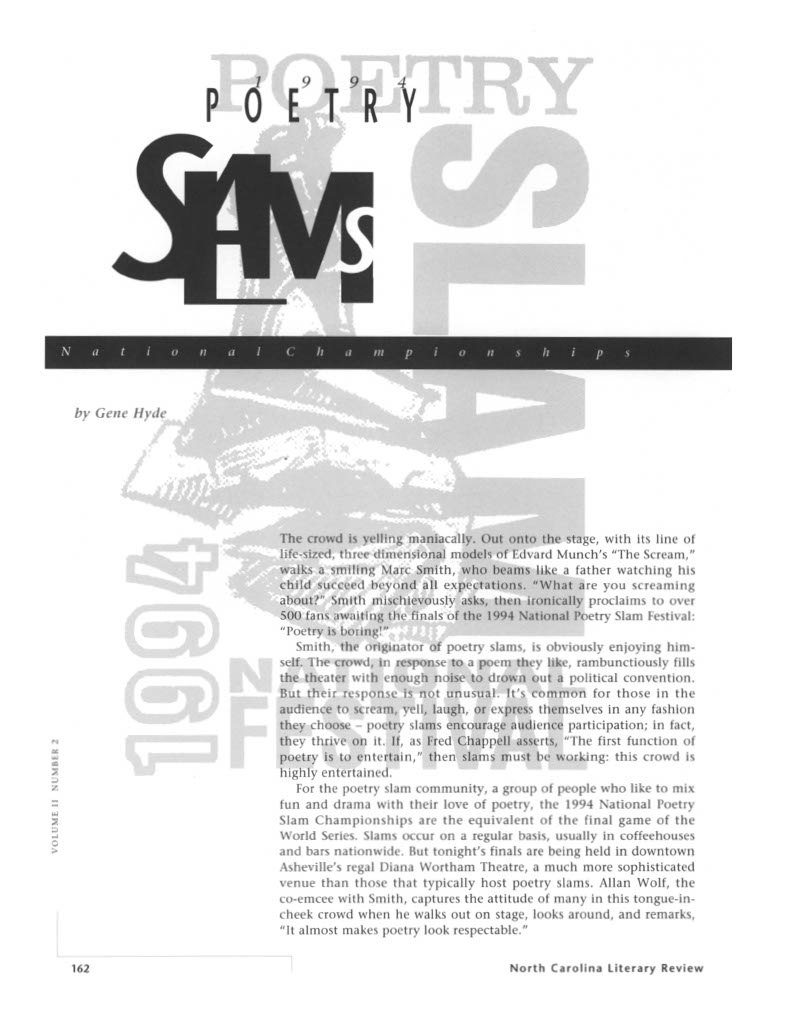Friday from the Archives: “1994 Poetry Slams National Championships” by Gene Hyde from NCLR 2.2 (1995).
by Kristi Southern
We are about to open the submission window for the second round of the Jaki Shelton Green Performance Poetry Prize Contest and we are excited to watch new performances from established and emerging artists across the state. For more information on how to enter submissions by April 30th, visit our website. And let’s revisit the state slam poetry scene from one of our earliest issues.
“Poetry is boring!” founder of the poetry slam movement Marc Smith proclaims to the audience of the 1994 National Poetry Slam Festival at the Diana Wortham Theater in Asheville, NC. Gene Hyde’s article in NCLR’s 1995 issue gives readers a glimpse into the lively event, attended by over 100 poets from over 200 cities nationwide, as they commune and compete at what he compares to the World Series – in this case, the World Series of Poetry. Diverse teams of four as well as individuals performed hundreds of poems in hopes of going home with first place recognition, including a two-year-supply of Moon Pies and RC Cola, to an audience encouraged to participate – “in fact, they [thrived] on it.” Hyde recounts four days of inclusivity, variety, “hollering and yelling,” and “the serious and the silly,” at a slam that is “exciting, moving, entertaining, and thought-provoking – what poetry ought to be.”
Hyde’s article shares a brief background on the poetry slam grassroots movement, as it serves to take back poetry, in a sense, from the world of academia. “The very word poetry repels people,” Hyde notes, followed by his assertion that this is due to “what schools have done to it.” While the 1994 slam competition was attended by both poets and judges from the academic community – teachers, students, writers – it was also made up of participants identifying themselves as filmmakers, ministers, troublemakers, and parents. Co-emcee and poet, Allan Wolf believes slams give “evidence that poetry is in the process of redefining itself as an ‘art form of the people.’ An inclusive art form,” and that slams are “about normal people who say poetry is a good thing.”
Hyde praises the poets for their “exceptional work,” and his tone, as well as example poems provided, illustrate a range of light, almost comical subjects to those with more weight: poets move from the perspective of a foul ball to a father and son’s divide to a fatal whipping. Topics include social issues, controversial relationships, identity, and personal anecdotes. Variety, according to Wolf, serves as a “key ingredient” to a successful slam. Hyde’s essay shows poetry slams are energetic and fun, perhaps “heavy on show,” but provide “an equally heavy dose of substance,” and while “some of the poetry may not be as good as a listener would hope,” other selections “may be better than expected, surprising, startling, or otherwise emotionally engaging.”
Read Hyde’s entire article, as well as a few poems from the event, by purchasing a copy of the ’95 issue.
